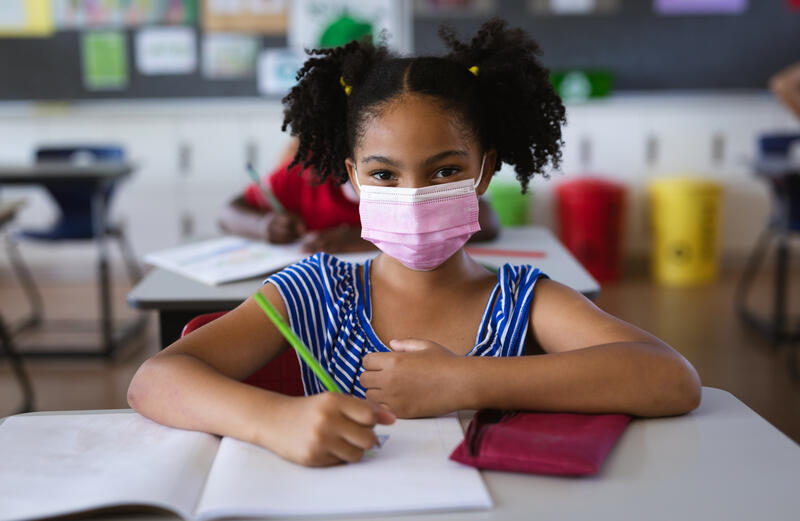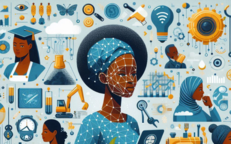Rethinking And Reimagining Education In Post-COVID Africa: A Webinar Report

This is the 09th post in a blog series to be published in 2022 by the Secretariat on behalf of the AU High-Level Panel on Emerging Technologies (APET) and the Calestous Juma Executive Dialogues (CJED)
The COVID-19 pandemic has exhibited enormous disruptions within the African education system as most schools were closed at the onset of the pandemic to curb the spread of the disease. During the pandemic's peak in 2020, approximately 32 million children in Eastern and Southern Africa were out of school. This was the case because most African governments had imposed strict lockdowns to prevent the further spread of COVID-19. To address the disruption caused by the COVID-19 pandemic, many African schools attempted to continue their teaching and learning activities using online means during this period. This was accomplished through e-learning tools such as Blackboard, Google Meet, Microsoft Teams, and Zoom.
The disruptions caused by the pandemic have been felt in education and other economic sectors such as health, agriculture, and trade. In terms of education, particularly schools, the lockdowns have exposed the digital divide in Africa. The pandemic also increased school dropouts in some African countries. For example, South Africa has observed approximately 750,000 students that have dropped out of school due to the pandemic.[1] The pandemic has also exposed the lack of information and communication technology infrastructure investment across the African continent, resulting in limited internet access and reliable broadband.
The COVID-19 pandemic has threatened to derail the objectives of the African Union's Continental Education Strategy for Africa (CESA-2025) of transforming Africa's education and training systems. The CESA-2025 should generate sustainable knowledge, competencies, skills, innovation, and creativity suitable for Africa's socio-economic development and growth. However, at the onset of 2022, most African countries have since reduced their lockdown restrictions.
The pandemic has highlighted the gaps and opportunities in teaching and learning methodologies within African schools. Thus, now that schools are reopening, African countries should adapt to blended learning methodologies to adapt to the "new normal" of teaching and learning post-COVID-19. The African educational system can adapt to the hybrid system of e-learning and restricted physical classes to curb the spread of the pandemic. By doing so, African countries will be accelerating the aspirations of the CESA-2025 framework.
The weaknesses of the African education system were exposed at the peak of the COVID-19 pandemic. Most African schools and universities faced challenges during the pandemic lockdowns, highlighting that Africa's education system should adapt to incorporate technologies. This motivated the African Union High Level Panel on Emerging Technologies (APET) through the Calestous Juma Executive Dialogue (CJED) to organise a webinar to deliberate on rethinking and reimagining Africa's education in the post-COVID-19 era. This webinar convened various senior policymakers, decision-makers, education practitioners, scientists, innovators, and other relevant stakeholders for knowledge and national experience on how Africa's education can be recalibrated in the post-COVID-19 era.
Experts presented the need to bridge the gap between policy and practice within Africa's education post-COVID-19 era. Notably, African countries have instituted excellent education policies and legal frameworks that can potentially encourage socio-economic and human capital development. Thirty-eight (38) African countries were ranked amongst the 140 countries with the best education system. This was based on the skills development indicators developed by the World Education Forum. However, the challenge remains whether the education policies are being implemented throughout the African continent.
By efficiently implementing these education policies, African countries can effectively deliver the scientists and engineers needed to build up the continent's socio-economic activities. Therefore, African countries should address the policy implementation gaps, especially within the education system. Notably, this is mainly observed between policy and practice in schools and classrooms. Regrettably, suppose these policy and practice gaps remain unaddressed. There will be limited implementation and coordination of policy frameworks among authorities, leading to limited skills generation and teacher capacity. Thus, there is a need to increase the political will and adequate commitment, enable short-term planning and financing, and enhance the participation and engagement of local stakeholders.
In addition, African countries should provide adequate funding and bridge the technology divide, which remains endemic within the African education system. African schools should also take advantage of emerging teaching and learning technologies such as robotics, artificial intelligence, and digital technologies. This can also improve education leadership in all education sectors and decentralise Africa's education decision-making responsibilities to those close to the students. Most importantly, policymakers and policy implementers should clearly interpret and understand the intended policy frameworks to enable implementation. Additionally, African schools should ensure a relevant and responsive curriculum to the needs of Africa's local communities.
COVID-19 negatively impacted teaching and learning on teacher education in most African countries, especially in Ghana. All these countries were equally affected because most schools and universities were closed during the pandemic's peak. To mitigate these challenges posed by the pandemic, schools across the continent had to find innovative approaches through collaborative teaching. The use of emergency teaching methods enabled by national funding and supported by international partners enabled teacher training through online methodologies. Through this programme, Ghana teachers were taught how to utilise online teaching and learning and undertake assessments using tools such as Zoom and Microsoft teams. Consequently, this strengthened teachers' capacity in digital technologies for teaching and learning.
However, in Ghana, it was observed that most teachers and students did not have the required smartphones for online teaching and learning. Furthermore, internet access was limited because data, broadband, and internet connectivity were limited. Therefore, to mitigate these internet access challenges, students were provided with smart drive cards (SD) through which teachers and students could access teaching and learning materials from their smartphone devices. Furthermore, it was highlighted that most teachers had limited access to tablets and smartphones necessary for teaching and learning. However, resource mobilisation enabled approximately 500 teachers to have access to these smartphone gadgets at subsidised prices. Physical assessments were conducted in batches to minimise contact and cheating in tests and examinations.
Experts further suggested that practical lessons within the science, technology, engineering, and mathematics (STEM) subjects cannot be delivered effectively through virtual means. Instead, provisions should be made to have physical classes for those practical classes. This can help students acquire basic skills for simple experiential teaching and learning. In addition, efforts should be made to assist students to reacclimatise into physical teaching and learning since most of them are still stuck on online teaching. Provisions for internet access and data should be ensured to enable the blended teaching and learning approach. This will help teachers continue with the blended approach. Therefore, the zero-rated teaching and learning websites and digital technologies should be continued to ensure the blended approach.
Online teaching and learning should not be treated as a contingency plan to manage the pandemic lockdowns but as part of the teaching and learning delivery going forward. Therefore, more investments towards enabling online teaching and learning delivery should be ongoing and increased. African governments should prioritise infrastructural improvements and adjustments to enable blended teaching and learning. Moreover, support should be afforded to students in undergraduate and post-graduate to catch up on their studies. This includes the primary and secondary schooling severely interrupted by the pandemic lockdowns. Thus, social distancing and vaccine mandates should be carefully considered and implemented in schools and universities to better reintegration and normalise teaching and learning.
The recommendations from experts advised that African governments should prioritise innovation in education and capitalise on the recent technological influx of technologies across the African continent. Thus, African governments should invest more into technological infrastructure and investment teaching and learning technology to ensure the integration of ICT tools in teaching and learning. To this end, there should be strategic budgetary allocation to finance teaching and learning technologies and improve the teacher-pupil ratio through the blended approach to teaching and learning. African countries should also address the underlying infrastructural challenges impeding internet access and reliable broadband and data costs to enable a teaching and learning blended approach
Teacher training contents should be reviewed to reflect emerging technologies in education. i.e., artificial intelligence (AI), adaptive learning, augmented reality (AR), and blended teaching and learning. Hence, African governments should enhance their investments in high-quality online education, educational television, and radio for all Africans. These technologies can sustain learning for students at primary and secondary levels. African governments should also adequately fund Africa's education with more sources and pursue effective educational policy implementation and review. This is because the new technologies in education should enable learners to have independent learning, with teachers facilitating the learning process instead of teacher-centred learning pedagogy.
Since the COVID-19 disruptions have exposed the weaknesses of Africa's educational system, African governments should collaborate to build capacity for teachers for quality education delivery across the continent. Thus, there should be heightened participation and collaboration between teaching institutions and private sector institutions such as telecommunication companies.
Furthermore, educators and education institutions should explore various funding instruments and grants to improve online teaching and learning and upskilling and teacher capacity through various in-service teacher training platforms. Access to the internet through reliable broadband and affordable data charges should be pursued to enable a successful blended teaching and learning approach. Thus, African governments should intervene and engage telecommunication companies to improve the ICT infrastructure.
Finally, African countries should carefully develop and implement education interventions. African countries should avoid a one size fits all approach and interventions as different countries and regions within the African countries are at different levels of economic development. Therefore, African countries should deal with these challenges on a country-by-country basis.
If you are interested in joining future Webinars and have the recording for this webinar, please contact Ms Barbara Glover at BarbaraG@nepad.org.
Featured Bloggers – APET Secretariat
Justina Dugbazah
Barbara Glover
Bhekani Mbuli
Chifundo Kungade
[1] https://www.rotary.org/en/educating-in-a-pandemic-and-beyond?gclid=Cj0KCQjw3v6SBhCsARIsACyrRAlrrpKG4E_Dfes7OLFK_ad1NLYjcxpPXjwlbq3EA_qE4YRiSJAeGRoaAuNqEALw_wcB.


